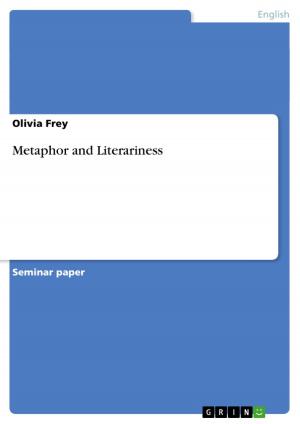| Author: | Axel Eberhardt | ISBN: | 9783638242127 |
| Publisher: | GRIN Publishing | Publication: | January 6, 2004 |
| Imprint: | GRIN Publishing | Language: | English |
| Author: | Axel Eberhardt |
| ISBN: | 9783638242127 |
| Publisher: | GRIN Publishing |
| Publication: | January 6, 2004 |
| Imprint: | GRIN Publishing |
| Language: | English |
Seminar paper from the year 2003 in the subject American Studies - Literature, grade: 1,7 (A-), University of Paderborn (Faculty for Cultural Studies), course: Seminar: American Short Story, 10 entries in the bibliography, language: English, abstract: In 1958 Bernard Malamud published his first short story collection The Magic Barrel. Whereas stories like e.g. 'The Magic Barrel' or 'The Lady of the Lake' were frequently discussed, 'Take Pity' got only little attention from the critics, although the story offers a wide spectrum of possible interpretations and contains several stylistic devices. The main focus of this term paper is the discussion of the realistic and fantastic elements in chapter III.4 and the different dimensions of compassion throughout the story in chapter III.5. The esteemed novelist and short story writer Bernard Malamud was born on April 28, 1914, in Brooklyn, NY and grew up on New York's East Side where his Russian-Jewish immigrant parents worked in their grocery store sixteen hours a day. He attended high school and college during the height of the depression. His family's experience was clearly echoed in his fiction. Whereas the setting varies in his novels, in his short fiction it is most often the East Side of New York. Malamud was also strongly influenced by classic nineteenth-century American writers such as Nathaniel Hawthorne, Henry David Thoreau, Herman Melville, and Henry James. Moreover, Malamud's works reflected a post-Holocaust consciousness in addressing Jewish concerns and employing literary conventions drawn from earlier Jewish literature. He began his career in the early 1940s by publishing stories in non-commercial magazines. His first major period of work extended from 1949 to 1961 when he was teaching at Oregon State College. During this period he produced three novels and a collection of short stories. Malamud won several fiction prizes, including the National Book Award in fiction for The Magic Barrel in 1959. After Malamud had moved back to Bennington College, his second working period (1961-1970) began, and both his stories and his next two novels took a more cosmopolitan and international direction. [...]
Seminar paper from the year 2003 in the subject American Studies - Literature, grade: 1,7 (A-), University of Paderborn (Faculty for Cultural Studies), course: Seminar: American Short Story, 10 entries in the bibliography, language: English, abstract: In 1958 Bernard Malamud published his first short story collection The Magic Barrel. Whereas stories like e.g. 'The Magic Barrel' or 'The Lady of the Lake' were frequently discussed, 'Take Pity' got only little attention from the critics, although the story offers a wide spectrum of possible interpretations and contains several stylistic devices. The main focus of this term paper is the discussion of the realistic and fantastic elements in chapter III.4 and the different dimensions of compassion throughout the story in chapter III.5. The esteemed novelist and short story writer Bernard Malamud was born on April 28, 1914, in Brooklyn, NY and grew up on New York's East Side where his Russian-Jewish immigrant parents worked in their grocery store sixteen hours a day. He attended high school and college during the height of the depression. His family's experience was clearly echoed in his fiction. Whereas the setting varies in his novels, in his short fiction it is most often the East Side of New York. Malamud was also strongly influenced by classic nineteenth-century American writers such as Nathaniel Hawthorne, Henry David Thoreau, Herman Melville, and Henry James. Moreover, Malamud's works reflected a post-Holocaust consciousness in addressing Jewish concerns and employing literary conventions drawn from earlier Jewish literature. He began his career in the early 1940s by publishing stories in non-commercial magazines. His first major period of work extended from 1949 to 1961 when he was teaching at Oregon State College. During this period he produced three novels and a collection of short stories. Malamud won several fiction prizes, including the National Book Award in fiction for The Magic Barrel in 1959. After Malamud had moved back to Bennington College, his second working period (1961-1970) began, and both his stories and his next two novels took a more cosmopolitan and international direction. [...]















